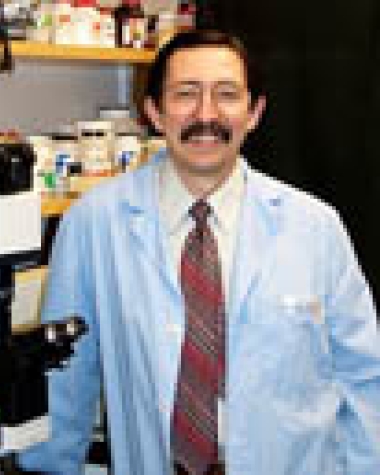Stephen Bloom, PhD

Professor Emeritus of Immunotoxicology and Cancer Genetics
Graduate School Professor
Department of Microbiology & Immunology
Cornell University College of Veterinary Medicine
C4 123 VMC
Ithaca, NY 14853
Profile
Research/Clinical Interests
Research
A major reason for failure to cure lymphoma and other cancers is cellular drug resistance. Mechanisms of drug resistance have been somewhat elusive and can be masked by such mechanisms as a highly expressed drug efflux pump. This difficulty has been overcome with the identification of selected avian virally-transformed lymphoma cell lines in which the P-glycoprotein drug efflux pump has the same activity in drug resistant and sensitive cell lines. Moreover, we have shown that the amount of initial cellular damage induced by several anti-cancer drugs is similar in these cell lines (Muscarella, D.E. and S.E. Bloom, Biochem. Pharm. 53:811-822, 1997). However, the downstream effects of drug exposure differ, with the T-lineage lymphoma cells showing resistance to both cell cycle inhibition and apoptosis. The B-lymphoma cells are inhibited in S and G2 phases of the cell cycle and enter apoptosis rapidly and extensively. More recently, we identified a panel of human Burkitt’s lymphoma cell lines that differ in anti-cancer drug resistance related to differential engagement of the apoptotic cascade (O’Brien, K., Muscarella, D.E., S.E. Bloom. Tox. Appl. Pharmacol. 174:245-256, 2001). We have been studying the molecular mechanisms that regulate the differential apoptosis induction in the human lymphoma model system. These studies have revealed four different specific mechanisms regulating resistance to the induction of apoptosis by anti-cancer drugs. These include high expression of the Bcl-2 protein, overexpression of hsp70 heat shock protein, Bax protein deficiency, and differential activation of ERK and p38 MAP kinases associated with regulating drug sensitivity (Muscarella, D.E. and S.E. Bloom J. Biol. Chem. 278:4358, 2003). Furthermore, our studies have identified treatments and signaling pathways that may be useful in overcoming anti-cancer-drug resistance (Muscarella, D.E. and S.E. Bloom, Tox. Sci., 68:82, 2002; Muscarella, D.E. et al., Tox. Sci., 73:66, 2003; Bloom, S.E. et al. Tox Sci. 89:214-223, 2006). Our more recent studies demonstrate that drug resistant lymphoma cells can be sensitized to undergo substantial drug-induced apoptosis upon stimulation of the p53 signaling pathway in combination with anti-cancer drug treatments (Bloom, S.E. and D.E. Muscarella, Proc. Amer. Soc. Cancer Res. 49:430-431, 2008).
Teaching
Dr. Bloom developed and continues to teach a course entitled Molecular Toxicology 6110. This course is cross-listed between Nutritional Sciences and Environmental Toxicology (NS6110 and Tox 6110). The course is offered each Spring semester and is available to both undergraduate and graduate students.
This course is focused on the cellular and molecular mechanisms of action of clinically-used drugs, environmental chemicals, and food contaminants. Potential adverse health effects including target-organ toxicity, developmental and reproductive abnormalities, immunotoxicity, neurodegeneration, and cancer are also emphasized. The course is organized in a lecture/discussion format with opportunities for the class to engage in research and discussions of specific topics of high current interest.
Education
PhD (Pennsylvania State University)
Biography/Professional Experience
Dr. Bloom is a Professor Emeritus in the Department of Microbiology and Immunology. He has been associated with the department since 1996. He received the BS degree in Biology from Long Island University in 1963, and then received his PhD degree in Genetics/Cell Biology from The Pennsylvania State University in 1968. Dr. Bloom has served as acting co-chair of the Dept. of Microbiology and Immunology (1999-2000), and Associate Director of the Institute for Comparative and Environmental Toxicology (1990-2004). He served as the Program Director for the NIH-supported training program in Environmental and Molecular Toxicology (1978-2004). His research program was supported by the NIH, USDA/NRICGP, and the Johns Hopkins CAAT program.


